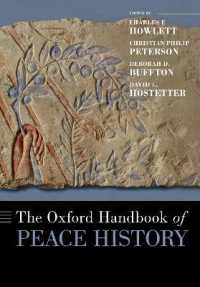- ホーム
- > 洋書
- > 英文書
- > Science / Mathematics
Full Description
In 1936, G. Birkhoff and J. v. Neumann published an article with the title The logic of quantum mechanics'. In this paper, the authors demonstrated that in quantum mechanics the most simple observables which correspond to yes-no propositions about a quantum physical system constitute an algebraic structure, the most important proper ties of which are given by an orthocomplemented and quasimodular lattice Lq. Furthermore, this lattice of quantum mechanical proposi tions has, from a formal point of view, many similarities with a Boolean lattice L8 which is known to be the lattice of classical propositional logic. Therefore, one could conjecture that due to the algebraic structure of quantum mechanical observables a logical calculus Q of quantum mechanical propositions is established, which is slightly different from the calculus L of classical propositional logic but which is applicable to all quantum mechanical propositions (C. F. v. Weizsacker, 1955). This calculus has sometimes been called 'quan tum logic'. However, the statement that propositions about quantum physical systems are governed by the laws of quantum logic, which differ from ordinary classical logic and which are based on the empirically well-established quantum theory, is exposed to two serious objec tions: (a) Logic is a theory which deals with those relationships between various propositions that are valid independent of the content of the respective propositions. Thus, the validity of logical relationships is not restricted to a special type of proposition, e. g. to propositions about classical physical systems.
Contents
1 / The Hilbert Space Formulation of Quantum Physics.- 1.1 The Hilbert Space.- 1.2 The Lattice of Subspaces of Hilbert Space.- 1.3 Projection Operators.- 1.4 States and Properties of a Physical System.- 2 / The Logical Interpretation of the Lattice Lq.- 2.1 The Quasimodular Lattice Lq.- 2.2 The Relation of Commensurability.- 2.3 The Material Quasi-implication.- 2.4 The Relation between Lattice Theory and Logic.- 3 / The Material Propositions of Quantum Physics.- 3.1 Elements of a Language of Quantum Physics.- 3.2 Argument-rules for Compound Propositions.- 3.3 Commensurability and Incommensurability.- 3.4 The Material Dialog-game.- 4 / The Calculus of Effective Quantum Logic.- 4.1 Formally True Propositions.- 4.2 Formal Dialogs with Material Commensurabilities.- 4.3 The Formal Dialog-game.- 4.4 The Calculus Qeff of Effective Quantum Logic.- 5 / The Lattice of Effective Quantum Logic.- 5.1 The Quasi-implicative Lattice Lqi.- 5.2 Properties of the Lattice Lqi.- 5.3 The Relation between Lqi and the Lattice Li.- 5.4 The Relation between Lqi and the Lattice Lq.- 6 / The Calculus of Full Quantum Logic.- 6.1 Value-definite Material Propositions.- 6.2 The Value-definiteness of Compound Propositions.- 6.3 The Extension of the Calculus Qeff.- 6.4 The Principle of Excluded Middle.- Concluding Remarks: Classical Logic and Quantum Logic.








